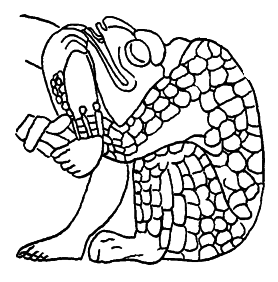An Inquiry: How do you paractice in anti-Cultural Imperiasm context?

反=文化帝国主義を実践するとは?
An Inquiry: How do you paractice in anti-Cultural Imperiasm context?

以下の文章をよくよんで、文化帝国主義という言葉を 定義する「以前に」文化帝国主義ないしは反=文化帝国主義を実践するとはどういうことか?について考えてみよう!
| "Consider this picture. It's really a very ordinary domestic scene, a family watching television - something millions of us do every evening. Yet there is clearly something extraordinary about the image, something that immediately strikes an exotic note. The family is watching in the open air; instead of armchairs, they are seated on blankets and oil-drums or on the desert sand. These people are obviously not Westerners, and the starkness of the setting seems to concentrate our attention on the Western technology that is absorbing them. The presence of the television is made strange in this context by the lack of the usual trappings of Western affluence. This is an extraordinary image of transported ordinariness." | 「この写真を見てほしい。これはごく普通の家庭の風景で、家族がテレビ
を見ている。しかし、この画像には明らかに非日常的な何かがある。一家は肘掛け椅子ではなく、毛布やドラム缶の上、あるいは砂漠の砂の上に座っている。こ
の人たちは明らかに西洋人ではなく、その茫漠とした環境は、彼らを吸収している西洋の技術に私たちの注意を集中させているようだ。テレビの存在は、西洋の
豊かさを示す通常の装飾品がないことで、この文脈において奇妙なものとなっている。これは、輸送された平凡さの異常なイメージである」。 |
| "There is a text accompanying the photograph which tells us the family is part of an aboriginal community, watching television in a remote part of Australia on the edge of the Tanami desert. It also suggests that their culture is under threat from what these people are doing, and notes that the community have set up their own broadcasting organisation - the Walpiri Media Association - 'to try to defend its unique culture from western culture'. Knowing this, we will probably read the picture in a certain way, inferring a domination from the image. The picture can thus quickly be grasped as representing cultural imperialism. | 「写真には文章が添えられており、この一家はアボリジニのコミュニティ
の一員であり、オーストラリアの奥地、タナミ砂漠の端でテレビを見ていると書かれている。また、彼らの文化がこれらの人々の行動によって脅かされているこ
とを示唆し、このコミュニティが「西洋文化から独自の文化を守ろうと」独自の放送組織、ウォルピリ・メディア・アソシエーションを設立したことを記してい
る。このことを知れば、私たちはおそらくこの絵からある種の支配を推測して読むだろう。こうして、この絵は文化帝国主義を表しているとすぐに理解できる。 |
| "What follows is an attempt to understand what kind of domination is registered in images like these." | 「以下は、このようなイメージにどのような支配が登録されているのかを理解する試みである。」 |
| "In fact, the picture invites us to see the television itself as the focus of domination. Its baleful light dominates the scene; all (or most) attention is fixed on it. The accompanying text speaks of 'Dallas and Sale of the Century ... beamed to the Australian deserts by satellite'. But is it what the people are seeing that threatens their culture? Does imperialism lie in the contents of foreign programmes? If so, how does this influence work? The screen appears to be blank; we can't see what the people are watching. But doesn't this blankness also signify our incapacity to know how alien texts are read, and the cultural effects they may have? What are these people thinking as we view them, as we might ourselves so easily be viewed, gazing at the shining monster?" | 「実際、この写真はテレビそのものを支配の焦点として見るよう私たちを
誘う。そのはげしい光が場面を支配し、すべての(あるいはほとんどの)注意がテレビに注がれている。添えられた文章は、「ダラスと世紀のセー
ル......衛星放送でオーストラリアの砂漠に送られる」と語っている。しかし、人々が見ているものは、彼らの文化を脅かすものなのだろうか?帝国主義
は外国の番組の内容に潜んでいるのだろうか?もしそうなら、その影響はどのように働くのだろうか?画面は真っ白に見え、人々が何を見ているのかわからな
い。しかし、この空白は、異質なテキストがどのように読まれ、どのような文化的影響を及ぼすかを私たちが知らないことを意味するのではないだろうか?私た
ちが彼らを見るとき、そして私たち自身が簡単に見られるかもしれないように、輝く怪物を見つめるとき、この人々は何を考えているのだろう?」 |
| "Or perhaps it is a question of what they are actually doing - sitting and watching television, a practice linked to a technology which is in a sense 'alien' to their culture? And if this is where the domination lies, perhaps the television is merely emblematic of a wider cultural imperialism - the spread of a certain Western-modern lifestyle? Why, then, shouldn't we see the icebox on which it is standing as equally indicative of cultural threat? And doesn't the obvious poverty of the family have some connection with the idea of cultural imperialism? Is this poverty itself a cultural question, or is there another distinct form of imperialism at work? If there is, what is the relation between these - economic and cultural - kinds of domination? And finally, what could it mean to speak of a practice people seem to choose to engage in - like watching television - as a form of domination? | あるいは、彼らが実際に何をしているのか、つまり座ってテレビを見てい
るのか、それは彼らの文化にとってある意味で「異質」なテクノロジーと結びついた行為なのか。支配がここにあるのだとしたら、テレビはより広範な文化的帝
国主義、つまりある種の西洋近代的ライフスタイルの普及を象徴しているにすぎないのではないだろうか?それなら、テレビが置かれているアイスボックスも同
様に文化的脅威の象徴と見るべきではないだろうか?そして、一家の明らかな貧困は、文化的帝国主義という考え方と何らかの関係があるのではないだろうか?
この貧困そのものが文化的な問題なのか、それとも別の帝国主義が働いているのか。もしあるとすれば、経済的支配と文化的支配の間にはどのような関係がある
のだろうか?そして最後に、テレビを見るというような、人々が自ら選んで行っているような行為を、支配の一形態として語ることには、どのような意味がある
のだろうか。 |
| These are some of the questions we will examine. But let us first stand back from the image and try to see it in a certain context. When I first saw this photograph, it had below it the caption: SEASON'S GREETINGS. It was on a Christmas card sent out by a British television company! The company actually supports the Walpiri Media Association as part of its corporate charity funding. Now this context complicates the signification of the image in a variety of ways, which I shall not try to spell out here. But it is worth taking up the point that, in this context, the picture is for Western consumption. The juxtaposition of an image of cultural domination with such a strong marker of Western culture as a Christmas greeting has a certain irony. But it also illustrates a more general point - that the discourse we're concerned with is inescapably lodged in the culture of the developed West. At issue is a discourse about other cultures and their right to flourish, but one that circulates primarily in the heart of the 'imperialist' West. 'Cultural imperialism' is a critical discourse which operates by representing the cultures whose autonomy it defends in its own (dominant) Western cultural terms. It is a discourse caught up in ironies that flow from its position of discursive power. This is, of course, as true for this book as for any other text it will discuss." | これらは、私たちが検証する疑問の一部である。しかし、まずはこの写真 から離れ、ある文脈の中でこの写真を見てみよう。私が初めてこの写真を見たとき、その写真にはキャプションが添えられていた: 季節の挨拶。イギリスのテレビ会社が出したクリスマスカードに書かれていた!実はこの会社は、企業チャリティーの一環としてウォルピリ・メディア協会を支 援しているのだ。さて、このような背景は、この画像の意味をさまざまな形で複雑にしている。しかし、この文脈で、この写真が欧米で消費されるものであると いう点を取り上げる価値はある。文化的支配のイメージと、クリスマスの挨拶という西洋文化の強い目印を並べることは、ある種の皮肉である。しかし、それは また、より一般的な点を示している。つまり、私たちが懸念している言説は、先進国である西洋の文化に不可避的に留まっているということだ。問題になってい るのは、他の文化とその繁栄の権利に関する言説であるが、それは主に「帝国主義的」な西洋の中心で流通しているものである。文化的帝国主義」は批判的な言 説であり、その言説が擁護する文化の自律性を、自らの(支配的な)西洋文化の用語で表現することによって機能している。それは、言説的権力の立場から生じ る皮肉にとらわれた言説である。もちろんこれは、本書が論じる他のどのテクストにも当てはまることである。 |
Cited from John
Tomlinson's text "Cultural Imperialism," 1991, Pp.1-2.
トムリンソン,ジョン『文化帝国主義』の章立て
リンク
文献
その他の情報
Copyleft, CC, Mitzub'ixi Quq Chi'j, 1996-2099
☆
 ☆
☆